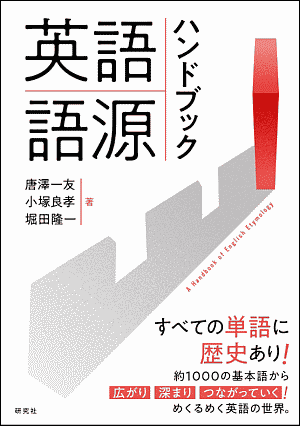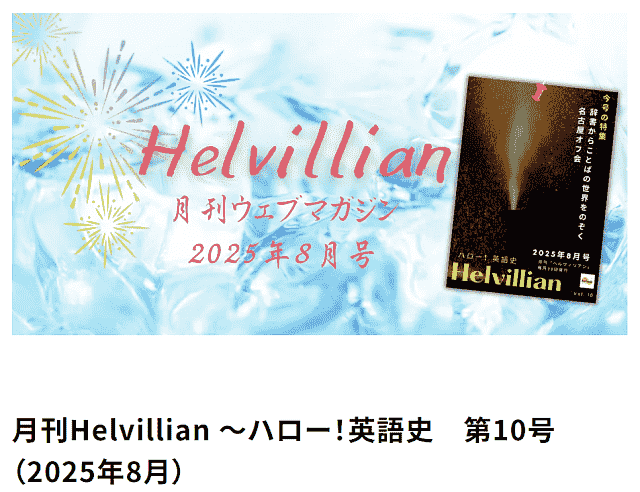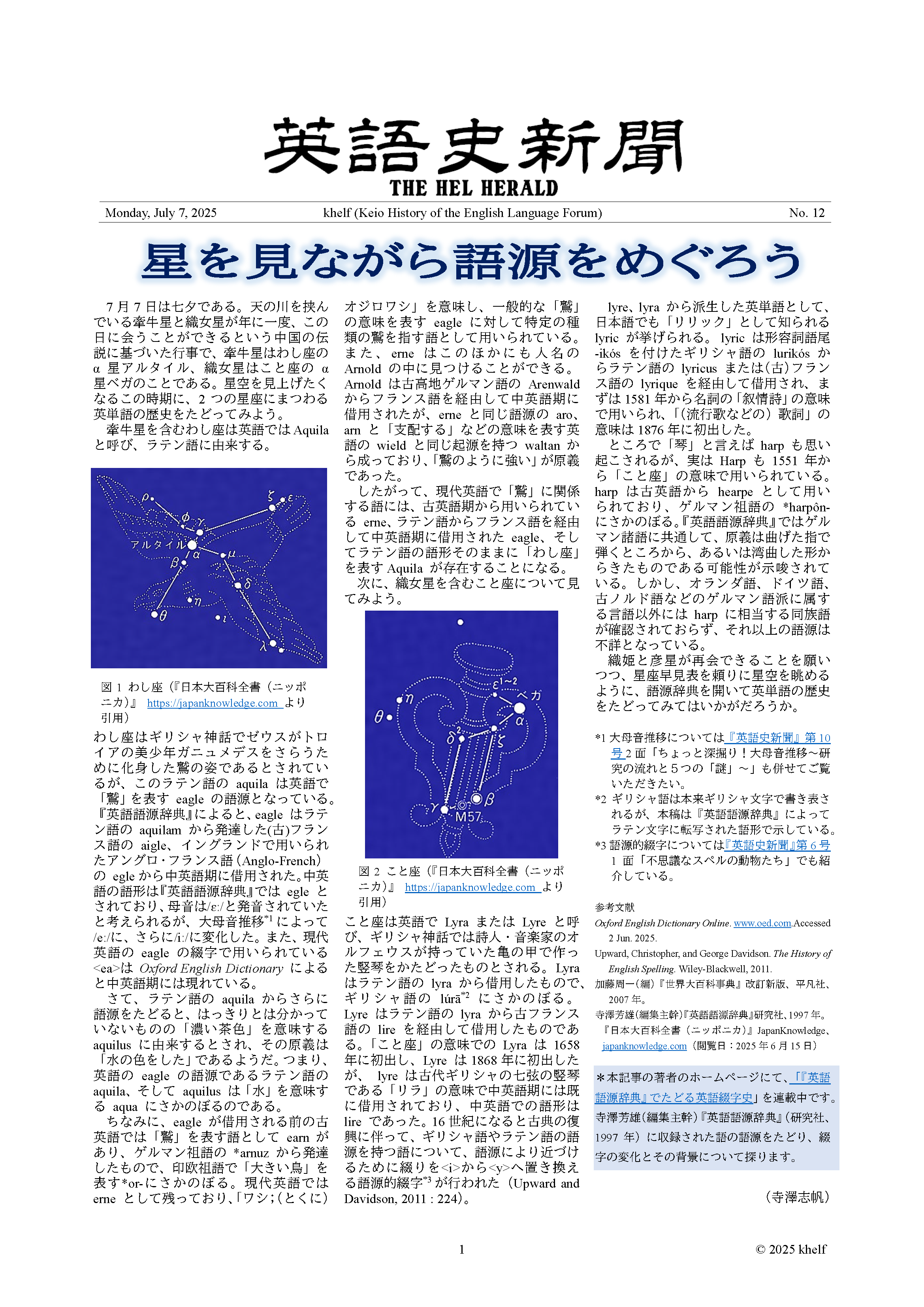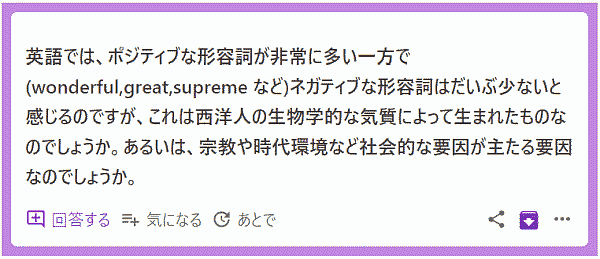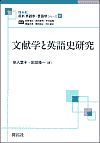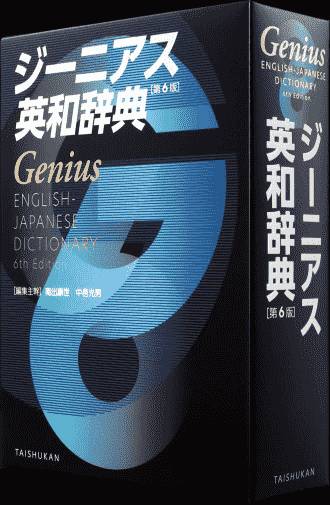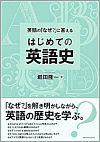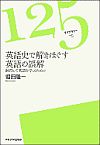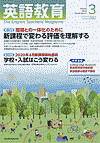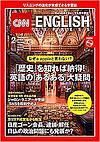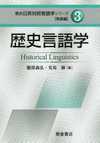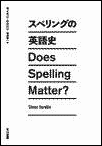最近 7 日分を以下に表示中 / 今月の一覧
2026-03-04 Wed
■ #6155. 「英語史の塔」の4冊と英語史の始め方 [tower_of_hel][hel_education][review][kochushoho][hee][kdee][hajimetenoeigoshi][kenkyusha][helkatsu]
「#6150. 「英語史の塔」が建っています」 ([2026-02-27-1]) にて「英語史の塔」 (tower_of_hel) が建った経緯について触れました.一見すると,研究社から出版されている英語史関連の既刊書・新刊書を積み上げただけの写真と思われたかもしれません.しかし,あの4冊の並びを眺めてみると,そこには英語史という分野に迫る上で,実に合理的な構造が隠されていることに気づきます.今回の記事では,その構造について解き明かしてみたいと思います.
英語史という広大な領域に足を踏み入れる際,その入口は決して一つではありません.学習者の関心や動機に応じて,大きく分けて2つのルートが存在します.
第1のルートは「全体から入る」アプローチです.このアプローチの土台となるのが,2016年に出版された拙著『英語の「なぜ?」に答えるはじめての英語史』です.本書では,英語史通史は第1章でさらっと概観するにとどめ,残りはトピック別に,すなわち音韻・綴字史,文法史,語彙史,英語社会史といった分野別の歴史を通じて,英語史的な「ものの見方」というレンズを提示することに主眼を置いています.目の前の英語を正誤で裁くのではなく,変化の結果として捉える思考のフレームワークを構築するための1冊と言えます.
第2のルートは「単語から入る」アプローチです.これに適しているのが,昨年6月に刊行された『英語語源ハンドブック』です.身近な語の語源にまつわるエピソードは,それ自体が独立しておもしろく,どこからでも読み始めることができます.1語1語の背景にあるドラマに触れるうちに,英語という言語がいかに多様な歴史を背負っているかを肌身で実感することになります.単語間の横のつながりにも気づく機会が多いでしょう
しかし,これら入口の本だけでは,まだ「塔」の全貌は見えてきません.そこからさらに一歩踏み込むための深化のプロセスが必要です.
英語史の全体像,英語史の見方という骨格を習得した学習者が次に進むべきは,体験としての英語史です.そこで力を発揮するのがこの2月25日に刊行された『古英語・中英語初歩〈新装復刊〉』です.概説を通じて得た知識を,実際の古英語や中英語の原文にぶつけてみる.音や形を自らの目で確かめる作業を通じて,歴史は抽象的な知識から,確かな手応えを伴う身体的な経験へと昇華されます.
一方で,単語と語源のおもしろさに目覚めた学習者が,その探究を縦に掘り下げたいと思ったときに必須となるのが,『英語語源辞典』新装版(2024年)です.『英語語源ハンドブック』で得た興味を,借用経路や形態変化の詳細,精緻な語形成の分析へとつなげていく.1語1語の背後に潜む数百年の時間を徹底的に掘り下げるこの作業は,まさに学問的な醍醐味に溢れています.
これら4冊の関係を整理すると,以下のようになります.
・ 全体ルート:思考のレンズを得る(『はじめての英語史』) → 原文で身体化する(『古英語・中英語初歩』)
・ 単語ルート:語源のおもしろさを知る(『英語語源ハンドブック』) → 1語1語を徹底的に深掘りする(『英語語源辞典』)
興味深いのは,どちらのルートから登り始めても,結局はもう一方のルートと交差する点にあります.単語を深く追えば必ず言語全体の歴史的背景に行き着きますし,全体を学べば必ず具体的な語の変化という事実に立ち返ることになります.英語史の学びは,平面的な移動ではなく,螺旋状に上昇していく循環構造です.本当に「塔」らしく見えてきたのではないでしょうか.
前回の記事で紹介した写真は,まさにこの立体的な学びの構造を可視化したものと捉えることができます.土台があり,横の広がりがあり,縦の高さと深さがある.これらが組み合わさって初めて,「英語史の塔」は安定して自立します.
どこからこの塔を登り始めるかは,読者の皆さん次第です.以下にまとめます.
1. まず英語史の全体像を俯瞰したいなら『はじめての英語史』から
2. 単語の語源や語彙のつながりに惹かれるなら『英語語源ハンドブック』から
3. 過去の英語の響きを直接聴きたいなら『古英語・中英語初歩』へ
4. 単語の語源を本格的に深掘りしたいなら『英語語源辞典』へ
英語史の入門者であれば1か2をお薦めしますが,すでに学びを始めている方は,心の赴くままにどこから始めても構いません.これら4冊は互いに補完し合い,行き来することで皆さんの「英語史」をより立体的なものにしてくれるはずです.
私は「英語史をお茶の間に」をモットーとしています.専門性の追求と親しみやすさは,決して矛盾するものではありません.「英語史の塔」の4冊は,その理想を具現化する1つの形です.塔は眺めるための飾りではなく,より遠く,より深くを見渡すための場所です.ぜひ,ご自身に合った登り方を見つけ,英語という言語の新しい景色を楽しんでいただければと思います.
全4冊へのアクセスは,研究社公式のこちらのHPが便利です.
・ 寺澤 芳雄(編集主幹) 『英語語源辞典』新装版 研究社,2024年.
・ 堀田 隆一 『英語の「なぜ?」に答えるはじめての英語史』 研究社,2016年.
・ 唐澤 一友・小塚 良孝・堀田 隆一(著),福田 一貴・小河 舜(校閲協力) 『英語語源ハンドブック』 研究社,2025年.
・ 市河 三喜,松浪 有 『古英語・中英語初歩〈新装復刊〉』 研究社,2026年.
2026-03-03 Tue
■ #6154. 英語史の月刊ウェブマガジン Helvillian の2026年3月号が公開されました [helwa][heldio][notice][helmate][helkatsu][helvillian][link]

先日2月28日(土),英語史の周囲に集まる有志による月刊ウェブマガジン Helvillian 3月号(第17号)が公開されました.春の足音を感じる今号も,圧倒的なボリュームと多角的な視点が詰まった1冊となっています.
今号の「1. 表紙のことば」は,私,堀田が担当させていただきました.滞在先の国際都市メルボルンを流れるヤラ川の早朝の風景です.多言語社会に暮らしてみて感じたことを綴っています.
続く執筆陣はいつものように豪華です.「2. ari」さんは,2月の季節感あふれるクイズや,AI を駆使した最新の英語教育ツール,さらに偽装複合語 holiday をめぐる話題まで,八面六臂の活躍.シリーズ記事も多く,いつもどこからネタを探してくるのかと不思議なほどですね.
「3. Grace」さんは,文字論の本を読みながら思いついたという悪名高い(?) literal 周辺の語彙を散策し,「4. lacolaco」さんの「英語語源辞典通読ノート」は D ゾーンを着実に進んでいます.
インド短期滞在の報告が楽しみな「5. mozhi gengo」さんは,現地の動物園事情から古英語の2月の呼び名 Solmonað,そして『古英語・中英語初歩〈新装復刊〉』の表紙デザインから受けたインスピレーションまで,驚くべき守備範囲の広さを見せています.
新連載や教育現場からの報告も充実しています.「6. sorami」さんによる中学生向け語源クイズは,ヘルメイトによるこの1ヶ月のhel活のなかでも大ヒットといってよいでしょう.「11. みー」さんの1月からシリーズ化が始まっている「小学生と学ぶ英語史」は,次世代に英語史や英語語源の楽しさを伝える素晴らしい試みです.「10. こじこじ先生」による英検と入試の現実的なアドバイスを含め,Helvillian 周りの活動はついに広い意味でのhel活は小中高のすべてをカバーするに至っています.「7. umisio」さんの「日曜研究」シリーズは,教科書・教育問題へ切り込んでおり,筆が止まりません.
「8. ykagata」さんの独英語比較シリーズは,safe や take などの基本語を扱うことが多いですが,そのほか総選挙の報道やラジオ放送の改編といった時事ネタも積極的に取り上げています.「9. あまねちゃん」さんは,note 初投稿ながら,景気のよい Wes hal! の話題などでインパクトを与え始めています.
「12. り~みん」さんの「千本ノック」論は,私が千本ノックを通じて何をしてきたのか,自分でも意味が分かっていなかったことに,1つのヒントを与えてくれた記事でした.「13. 佐久間」さんの歴史から見た生成AI論も,読み応えがあります.今こそ読んでおくべき記事ですね.
「14. 川上」さんは,英語史を硬派に攻める急先鋒ですが,今回はレギュラーの「やってます通信」のほかラテン語の流入を歴史的背景とともに前・後編で詳述しています.「15. 堀田」のセクションでは,メルボルンでの「開封の儀」や「英語史の塔」建設について触れています.
最後は「16. Grace」さんによるこの1ヶ月の helwa 活動報告と「17. umisio」さんによる編集後記です.編集委員でもあるお2方の3月号の総括が,なんともおもしろい.2月を通じて,皆でhel活を走り抜けてきたことがよくわかる締めとなっています.
今月も,寄稿者各々の英語史愛が爆発した号となっています.ぜひじっくりとお読みいただければと思います.
hellog 読者の皆さんも,このようなhel活コミュニティに加わってみませんか? ご関心のある方は,ぜひ気軽にプレミアムリスナー限定配信チャンネル 「英語史の輪 (helwa)」においでください.毎週火・木・土の午後6時に,heldio と変わらぬ熱量でお会いしましょう!
2026-03-02 Mon
■ #6153. 昨朝の朝日サンヤツ広告に『古英語・中英語初歩』と『英語語源ハンドブック』が掲載 [tower_of_hel][hel_education][kochushoho][hee][kenkyusha][helkatsu]

昨日3月1日(日)の朝日新聞朝刊サンヤツ広告に,研究社から出版されている4冊が掲載されました.最初の2冊は,ここしばらく私自身が推しに推してきた『古英語・中英語初歩〈新装復刊〉』と『英語語源ハンドブック』です.前者はつい先日,2月25日に刊行されたばかりの本,後者は昨年6月15日に刊行され3重版となっている本です.
今回この2冊が並んで掲載されたことには,「英語史をお茶の間に」届けようと日々hel活を展開している者として,感慨を覚えます.というのは,2冊は一見すると別々の目的をもつ本に見えるかもしれませんが,実は英語史という「塔」を登る上で,興味深い関係で結ばれているからです(cf. 「#6150. 「英語史の塔」が建っています」 ([2026-02-27-1])).
近々の記事で詳しく解き明かす予定ですが,英語史への入口には「全体から入るルート」と「単語から入るルート」の2つがあると考えています.『英語語源ハンドブック』は,身近な単語のエピソードから入る「単語ルート」の強力な案内人です.一方,『古英語・中英語初歩』は,英語史の骨格を学んだ者が次に進むべき「全体ルート」の深化プロセス,すなわち原文を通じた身体的経験を得られる1冊です.
この2冊は良い具合に交わります.『ハンドブック』で単語の語源に魅了されたのであれば,その語が生まれた時代にあって,どのような響きをもっていたのかを知りたくなるはずです.すると,自然と『初歩』の原文へと導かれていくでしょう.
逆に,『初歩』で古英語の格変化や中英語の綴字に悪戦苦闘している学習者が,個々の語の背景にあるドラマを知れば,その学習は彩り豊かなものへと変わります.
つまり,この2冊は,語源という「点」の知識を,文献という「面」の経験へと繋ぐ,あるいはその逆へと橋渡しする関係にあります.ミクロからマクロへ,そしてマクロからミクロへ.このクロスオーバーこそが,英語史の学びを立体的なものにしてくれるのです.
皆さんにおかれましては,以上の関係を意識しつつ,2冊の間をぜひ行き来してみてください.英語史のさらなる魅力に気づくことになるはずです.
・ 市河 三喜,松浪 有 『古英語・中英語初歩〈新装復刊〉』 研究社,2026年.
・ 唐澤 一友・小塚 良孝・堀田 隆一(著),福田 一貴・小河 舜(校閲協力) 『英語語源ハンドブック』 研究社,2025年.
2026-03-01 Sun
■ #6152. 「偽装複合語」で大喜利をしました [word_play][disguised_compound][lexicology][compound][etymology][notice][kochushoho][kenkyusha][kochukoneta30][hel_ogiri]
2月16日(月)に私の X アカウント @chariderryu にて,第3回英語史大喜利 (hel_ogiri) を開催しました.今回のお題は,おもしろい偽装複合語 (disguised_compound) を寄せてくださいというものでした.ちょうど『古英語・中英語初歩〈新装復刊〉』のカウントダウン企画「古中英語30連発」の No. 22 として「daisy 「ヒナギク」の語源が古英語の dæges ēage "day's eye" だと知っていましたか?」と投稿した直後に,今回の大喜利も開催しました.
大喜利開催の協力者でもある heldio/helwa リスナーの ari さんのユーモラスな入れ知恵により,今回の大喜利は,遊び心を込めて「ごん,お前だったのか」選手権と命名されました.ネタ披露のフォーミュラとして,次の「ごん構文」が X 上に飛び交いました.
・ Daisy 「ごん,お前… Day (日) の Eye (目) だったのか…」
過去2回の大喜利に比べ,かなり難易度の高いお題でしたが,英語語源の猛者たちが多くの良質な例を寄せてくださいました.いつものように私の独断と偏見で,おもしろかったもの,勉強になったものをいくつか掲載します.
・ Gospel 「ごん,お前… Good (良い) Spell (知らせ) だったのか…」
・ Curfew 「ごん,お前… Cover (消す) Fire (火) だったのか…」
・ But 「ごん,お前… By (そばに) Out (外に) だったのか…」
・ About 「ごん,お前… On (上に) By (そばに) Out (外に) だったのか…」
・ Kitchen 「ごん,お前… Cook (料理する) の -ina (場所) だったのか…」
・ Don 「ごん,お前… Do (する,置く) の On (上に) だったのか…」
・ Lapwing 「ごん,お前… Leap (跳ねる) Wink (ウィンク) だったのか…」
・ Answer 「ごん,お前… And (に対して) Swear (誓う) だったのか…」
・ Worship 「ごん,お前… Worth (価値) -ship (があること) だったのか…」
・ Chameleon 「ごん,お前… Khamaí (地を這う) Léōn (獅子) だったのか…」
・ Zebra 「ごん,お前… Equus (馬) Ferus (野生) だったのか…」
・ Giraffe 「ごん,お前… Zurnā (ラッパ) Pāy (足) だったのか…」
・ Pyjamas 「ごん,お前… Pāy (足) Jāma (服) だったのか…」
・ Philip 「フィリップ,お前… Philéō (好き) Híppos (馬) だったのか…」
・ Barn 「ごん,お前… Bere (大麦) Ærn (家屋) だったのか…」
そして,ari さんが,まさかの掟破りのフォーマットで11連発.
その bridal は eleven の決まりがあった.11時,neighbor の Marshal が alarm を鳴らすと,一匹の squirrel が vinegar と garlic 塗れの handkerchief を奪い去った.この dismal な光景こそが,求婚に対する彼女の明確な answer だった.
こんなにたくさん例が集まるとは! ぜひ英単語語源学習とボキャビルにご活用ください.
皆さんから寄せていただいたのは,大部分が英語からの例でしたが,以下は寄せていただいた日本語からの例です.日本語を主とすると大変なことになりそうですね.
・ 聖(ひじり) 「ごん,お前… 日 (ひ) 知り (しり) だったのか…」
・ 社(やしろ) 「ごん,お前… 屋 (や) 代 (しろ) だったのか…」
・ 仏(ほとけ) 「ごん,お前… 浮屠 (ふと=ブッダ) 家 (け) だったのか…」(諸説あり)
本記事と同じ趣旨で,2月27日の heldio にて「 #1734. 「偽装複合語大喜利」 --- 皆さんからの傑作選を発表」をお届けしました.ぜひそちらもお聴きください.
2026-02-28 Sat
■ #6151. The Oxford Guide to Etymology --- 英語語源学に入門したい方へお薦めする1冊 [etymology][hel_education][review][kdee][hee]
おかげさまで『英語語源ハンドブック』や『英語語源辞典』の認知度が高まってきている.語源というものは,何語であっても,人を引きつけるものである.人は言葉を道具として使いこなせるばかりか,その道具について知りたい,語りたい生き物だからだ.
しかし,辞典やハンドブックにみられる記述は,当然のことながら,最初から知られていたわけでもないし,記されていたわけでもない.語源の専門家が調査して初めて得られた知識が,たいていの場合にコンパクトに提示されているということである.言い方をかえれば,語源的知識は「所与」のものではない.所与のように見えるかもしれないが,そうではない.
OED の語源欄の編集に関わっている Durkin (ix) が,語源学の入門書 The Oxford Guide to Etymology のイントロで,"About this book" と題する1節を書いている.抜き出して読んでみよう.
Etymologies appeal to people with a very wide variety of interests and intellectual backgrounds. A very few people, such as myself, spend most of their time researching etymologies. A slightly larger number do so very occasionally. Many, many more people look at etymologies, but have never researched any themselves. Some people will never even have thought of etymologies as things which need to be researched. Particularly when etymologies are encountered in the compressed form found in many dictionaries, they can seem to be a given, rather than the (often very tentative) results of extensive research.
This book is intended for anyone who has taken the important first step of realizing that etymologies are the result of research, and would like to discover something about the nature of that research, and the principles and methodologies which underlie it.
『英語語源ハンドブック』を通読するなどして英単語の語源に十分に親しんだ方で,かつ語源が所与のものではないことを認識した上で,専門家がどのように語源を探るものなのかを部分的に追体験したい方に,お薦めしたい1冊である.歯ごたえはあるかもしれないが,英語史や歴史言語学についても同時に学べる点でもすぐれた書籍だ.語源学の楽しさと厳しさを知りたい方は,ぜひ!

・ 寺澤 芳雄(編集主幹) 『英語語源辞典』新装版 研究社,2024年.
・ 唐澤 一友・小塚 良孝・堀田 隆一(著),福田 一貴・小河 舜(校閲協力) 『英語語源ハンドブック』 研究社,2025年.
・ Durkin, Philip. The Oxford Guide to Etymology. Oxford: OUP, 2009.
2026-02-27 Fri
■ #6150. 「英語史の塔」が建っています [note][tower_of_hel][kochushoho][hee][kdee][hajimetenoeigoshi][kenkyusha][helkatsu]

昨日の記事「#6149. 『古英語・中英語初歩』が新装復刊」 ([2026-02-26-1]) で,伝説的な入門書『古英語・中英語初歩』の新装復刊をご案内しました.復刊に先だつこと9日ほど前の2月18日に,なんと上記の「英語史の塔」 (tower_of_hel) が建ちました.壮観ですね.この「英語史の塔」の建設の経緯については,note 記事「「英語史の塔」が建設されました」にまとめておきましたが,hellog としても概要を記しておきます.
2026年2月18日(水)の昼下がり,X にて写真とともに「……建ちました。」とだけ投稿しました.実はこの「英語史の塔」が建設された旨のご案内でした.
発端は,現在滞在中のオーストラリアはメルボルンからの,ほんの軽い冗談でした.ここ数週間『古英語・中英語初歩〈新装復刊〉』(研究社;初版1935年)を「推し」続けている身として,同社から出ている拙著を含めた英語史関連の4冊をまとめて紹介したいという切望が日増しに強まっていました.
・ 寺澤 芳雄(編集主幹) 『英語語源辞典』新装版 研究社,2024年.
・ 堀田 隆一 『英語の「なぜ?」に答えるはじめての英語史』 研究社,2016年.
・ 唐澤 一友・小塚 良孝・堀田 隆一(著),福田 一貴・小河 舜(校閲協力) 『英語語源ハンドブック』 研究社,2025年.
・ 市河 三喜,松浪 有 『古英語・中英語初歩〈新装復刊〉』 研究社,2026年.
しかし,これらの本を日本から持参してきたわけはないので,紹介するにもパンチが効きません.そこで,研究社の営業担当のTさんに,4冊をそれらしく積み上げて,「英語史の塔」みたいに撮ってもらえますか? と無茶振りをお願いしてみました.1冊ずつちょこんとバランスよく重ねて,ちょっとしたネタ写真にでもなれば十分,という軽い気持ちでした.
ところが数日後,Tさんより送られてきた写真を見て,目を見張りました.4冊の積み木遊びのようなレベルではなく,各書籍を数部ずつ巧みに組み合わせた,本気の建築物が屹立していたのです.私の軽い冗談が,プロの本気を引き出してしまったようです.
感激して写真を眺めながら,感慨に耽りました.考えてみれば,英語史研究とは,まさにこのように「積み上げる」営みだったのではないかと.時代を積み上げ,語彙・音声・文法を積み上げ,横の広がりと縦の深さを積み上げてきた.そして,『古英語・中英語初歩』のオリジナル版が刊行された1935年から,新装復刊の2026年に至るまで,先人の知恵が詰まった本を積み上げてきた.気づいてみれば,それは一朝一夕にはガタつくことのない「塔」になっていた,ということです.
「英語史の塔」お構成する4冊は,それぞれに役割が異なります.
・ 『英語語源辞典』は英単語の歴史を深掘りしていく本
・ 『はじめての英語史』は英語史の考え方をつかむ本
・ 『英語語源ハンドブック』は英語語源の世界を横断する本
・ 『古英語・中英語初歩』は古い英語の原文に触れる本
一見バラバラの入口に見えて,実は1つの大きな英語史という建築物を構成する重要なパーツです.
hellog 読者の皆さん,この春はいずれの入口からでも英語史の世界に入ってみませんか? 全4冊へのアクセスは,研究社公式のこちらのページ の下方の「関連書籍」,あるいは「英語史関連・周辺テーマの本」のページからが便利です.
・ 寺澤 芳雄(編集主幹) 『英語語源辞典』新装版 研究社,2024年.
・ 堀田 隆一 『英語の「なぜ?」に答えるはじめての英語史』 研究社,2016年.
・ 唐澤 一友・小塚 良孝・堀田 隆一(著),福田 一貴・小河 舜(校閲協力) 『英語語源ハンドブック』 研究社,2025年.
・ 市河 三喜,松浪 有 『古英語・中英語初歩〈新装復刊〉』 研究社,2026年.
2026-02-26 Thu
■ #6149. 『古英語・中英語初歩』が新装復刊 [notice][kochushoho][kenkyusha][oe][me]
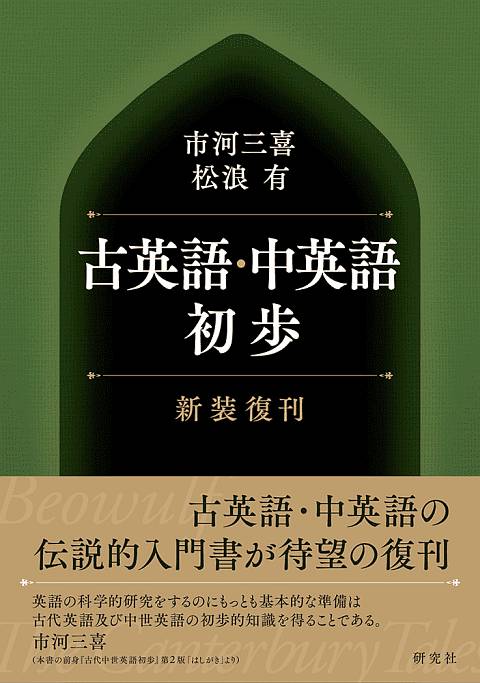
昨日2月25日(水),ついに古英語・中英語の伝説的な教科書『古英語・中英語初歩』が新装復刊となりました.1ヶ月前の「#6117. 伝説的入門書『古英語・中英語初歩』が新装復刊されます!」 ([2026-01-25-1]) を皮切りに,この hellog でも,また他のメディアでも,本書の1ファンとして今回の復刊を祝い,待ち望んできましたが,ついに入手できるようになりました.
本書は初学者が古英語および中英語の「初歩的知識を得ること」を目的として書かれています.本格的な科学的研究への第一歩として,あるいはそこまで行かなくとも,現代英語を歴史的な観点から深く理解するための入り口として,これほど丁寧で優しい作りとなっている教科書は稀です.
本書の構成は,大きく古英語パートと中英語パートに分かれています.それぞれの部門において,まず綴字・発音,文法,時代背景に関する解説がなされます.とりわけ現代英語から距離のある古英語については,細かく解説されています,その後に実際の原文を読み解く「テキスト編」が続きます,語学書として王道の構成です.特筆すべきは,初学者の便宜のために,各パートの最初のいくつかのテキストには,IPA による発音記号が1単語1単語について丁寧に付されている点です.これは,慣れない古い文字体系に戸惑う読者にとって,きわめて手厚い計らいです.
すべてのテキストに,現代英語訳が付されている点も見逃せません.英語で書かれた古英語・中英語の教科書では,現代英語訳は省略されるのが通例ですが,本書ではあえてこれを完備することで,現代英語との語順や綴字の対比を促す工夫がなされています.日本の英語学習者のツボを押さえた解説と相まって,独学を可能にするための情報が,この一冊の中に完全に閉じ込められています.
巻末には,テキストに現われる単語を網羅したグロッサリー(小辞典)も付いています,この一冊を仕上げれば,より専門的な英語史の世界へと羽ばたく準備が整うとともに,歴史的な観点からの現代英語の理解がぐんと深まるでしょう.今回の新装復刊にあたっては,旧版よりもコンパクトで,鞄に入れて持ち運びやすい現代的な装丁に生まれ変わっています.
定価3,300円(税込)という価格は,この充実した内容からすれば間違いなく「お得」と断言できます.これまで英語史のおもしろさに魅せられながらも,古英語や中英語の原文に踏み込む勇気は出なかったという方々にとって,本書は背中を押してくれる最高の入門書となるはずです.ぜひ、この伝説的入門書を手にとって,英語という言語の懐の深さを体感してください.表紙に扉のデザインが施されており,背景も扉の向こう側もディープでダークな色ですが,これは古英語・中英語の「深遠さ」や「沼」を表わしているものと解釈したいところです.扉を開くには少し怖そうですが,それだけ濃厚な世界が待っているのだと捉えていただければ.
昨日の heldio にて,本記事と同じ趣旨を「#1732. 本日,伝説的入門書『古英語・中英語初歩』が新装復刊」として熱量をこめてお届けしました.ぜひそちらもお聴きいただければ.
・ 市河 三喜,松浪 有 『古英語・中英語初歩〈新装復刊〉』 研究社,2026年.
| このページへのアクセス数 | |
| 最終更新時間 | 2026-03-04 08:06 |
Copyright (c) Ryuichi Hotta, 2009--

